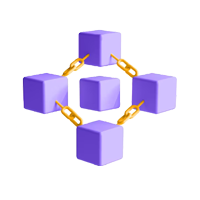Top Features of an Enterprise Blockchain
Enterprise blockchain, a transformative force reshaping the business landscape, introduces a suite of features that redefine how organizations operate and collaborate. Delving into the intricate details of this technology unveils a myriad of capabilities designed to enhance transparency, security, and efficiency within enterprise environments.
1. Decentralization
At the core of enterprise blockchain lies the principle of decentralization. Unlike traditional centralized systems, an enterprise blockchain distributes control across network participants. This not only eliminates the need for a central authority but also ensures a more democratic and secure system where all participants have equal access and authority.
2. Immutability
The concept of immutability is a cornerstone feature. Once data is recorded on the blockchain, it becomes practically impossible to alter. This feature ensures the integrity and trustworthiness of the information stored on the blockchain, making it a reliable source of truth for enterprise transactions.
3. Smart Contracts
Empowering automated and self-executing agreements, smart contracts are programmable scripts that execute predefined actions when specific conditions are met. This feature automates complex business processes, reducing the need for intermediaries and streamlining workflows within the enterprise.
4. Enhanced Security
Enterprise blockchain employs advanced cryptographic techniques to secure data, ensuring that sensitive information remains confidential and tamper-proof. The decentralized nature of the network also makes it inherently resistant to hacking attempts, providing an additional layer of security.
5. Transparency and Traceability
Every transaction on an enterprise blockchain is recorded in a transparent and traceable manner. This feature facilitates a comprehensive audit trail, enabling organizations to track the flow of assets, goods, or information throughout the entire supply chain or business process.
6. Interoperability
Enterprise blockchain platforms are designed to integrate seamlessly with existing systems, fostering interoperability. This feature ensures a smooth transition for organizations incorporating blockchain into their operations, allowing them to leverage the benefits without overhauling their existing infrastructure.
7. Scalability
As enterprises grow, so do their demands on technology. Enterprise blockchain solutions are built with scalability in mind, ensuring that the system can handle an increasing volume of transactions and participants without compromising performance.
8. Permissioned Access
Unlike public blockchains, enterprise blockchains often have restricted access. Participants in the network are granted permission to access and contribute to the blockchain based on their roles and responsibilities within the organization. This feature ensures that sensitive business information remains within the intended circle of trust.
Top 15 Benefits of Enterprise Blockchain
Enterprise blockchain emerges as a transformative force, revolutionizing the business landscape with a myriad of advantages. Let's delve into the key benefits that make enterprise blockchain a game-changer for modern businesses.

1. Reduced Costs
Enterprise blockchain streamlines operations by minimizing the need for intermediaries, reducing transactional costs, and optimizing resource allocation. It's a cost-effective solution that fosters financial efficiency.

3. Traceability
From inception to delivery, every step of a process is traceable on the blockchain. This traceability enhances accountability, allowing businesses to pinpoint inefficiencies, address issues promptly, and build robust audit trails.

5. Increased Efficiency and Speed
With streamlined processes and reduced dependencies, enterprise blockchain accelerates the speed of transactions. Real-time information exchange among stakeholders fosters quick decision-making and operational efficiency.

7. Immutability
Once information is added to the blockchain, it cannot be altered or deleted. Immutability safeguards the integrity of data, providing a reliable and tamper-proof record of transactions.

9. Automated Transactions
Enterprise blockchain facilitates automated transactions, eliminating manual intervention and the potential for errors. This automation streamlines workflows and enhances overall operational efficiency.

11. Tokenization
Tokenization of assets on the blockchain facilitates fractional ownership, enabling new forms of investment and liquidity. It democratizes access to traditionally illiquid assets.

13. Fraud Prevention
The transparent and secure nature of enterprise blockchain makes it inherently resistant to fraud. Any attempt to manipulate the system is easily detectable, providing robust fraud prevention mechanisms.

2. Transparency
Transparent and decentralized, enterprise blockchain ensures that all stakeholders have real-time access to a single version of the truth. This transparency eliminates data discrepancies and builds trust across the ecosystem.

4. Enhanced Security
Utilizing advanced cryptographic techniques, enterprise blockchain provides an unparalleled level of security. Data integrity is maintained, and the risk of unauthorized access is significantly reduced, fortifying the overall cybersecurity posture.

6. Decentralized
Decentralization ensures that no single entity has control over the entire network. This democratized structure eliminates the risk of a single point of failure and enhances resilience.

8. Smart Contracts
Smart contracts automate and execute predefined terms of an agreement when conditions are met. This not only expedites processes but also eliminates the need for intermediaries, reducing costs.

10. Trust
Built on a foundation of transparency and immutability, enterprise blockchain fosters trust among stakeholders. Trust becomes inherent, driving stronger collaborations and partnerships.

12. Supply Chain Finance
In the realm of supply chain management, enterprise blockchain optimizes financing processes, reduces delays, and enhances overall supply chain efficiency.

14. Customer Engagement
With enhanced transparency, businesses can offer customers real-time visibility into their transactions and supply chain processes, fostering a higher level of customer trust and engagement.
In essence, the benefits of enterprise blockchain extend far beyond just cost reduction. They pave the way for a future where businesses operate with unprecedented efficiency, security, and trust, ushering in a new era of technological excellence.
Top 6 Types of Enterprise Blockchain
In the realm of blockchain technology, enterprises have witnessed a transformative evolution, marked by a myriad of solutions catering to diverse needs. Understanding the types of enterprise blockchain is akin to unraveling a rich tapestry of possibilities. Here, we delve into the intricacies of the various types, each weaving its unique thread into the fabric of modern business.
1. Public Enterprise Blockchain
Public enterprise blockchains operate on a decentralized network, providing transparency and inclusivity like Evoke Blockchain. Open to all participants, these blockchains often leverage native tokens, fostering a collaborative ecosystem where trust is distributed across the network. Popular for their transparency, public blockchains are often employed in industries demanding high levels of trust and visibility.
2. Private Enterprise Blockchain
Contrasting with public blockchains, private enterprise blockchains are exclusive networks accessible only to authorized participants. Maintaining control over access and permissions, private blockchains prioritize privacy and are often utilized by organizations seeking a secure and efficient internal system. This type is ideal for fostering collaboration among trusted partners within a closed ecosystem.
3. Consortium or Federated Enterprise Blockchain
Combining the strengths of public and private models, consortium or federated enterprise blockchains are governed by a group of organizations rather than a single entity. This collaborative approach ensures shared decision-making, making it well-suited for industries where multiple stakeholders collaborate on a common platform while retaining a degree of privacy and control.
4. Permissionless Enterprise Blockchain
Permissionless enterprise and Evoke blockchain operate on the principles of decentralization and open access. Participants in these networks do not require permission to join or validate transactions, emphasizing the principles of inclusivity and openness. Permissionless blockchains are often associated with cryptocurrencies and decentralized finance (DeFi) applications.
5. Permissioned Enterprise Blockchain
In contrast, permissioned enterprise blockchains impose restrictions on participation, requiring explicit permission to join the network or validate transactions. This controlled access ensures a higher degree of security and is frequently adopted by enterprises where trust and regulatory compliance are paramount.
6. Hybrid Enterprise Blockchain
The hybrid enterprise blockchain model merges elements of both public and private blockchains. This allows organizations to balance the transparency and inclusivity of public networks with the privacy and control of private networks. Hybrid solutions offer a versatile approach catering to a wide array of business requirements.
Importance of Enterprise Blockchain for Business
In an era where digital transformation is a cornerstone of success, the importance of enterprise blockchain for business cannot be overstated. Blockchain, originally known as the underlying technology for cryptocurrencies, has evolved into a powerful tool reshaping the business landscape. Let's delve into the pivotal role that enterprise blockchain plays in driving efficiency, security, and innovation for businesses of all sizes.
1. Enhanced Security
At the forefront of the importance of enterprise blockchain is its ability to fortify security. The decentralized and cryptographic nature of blockchain ensures that data is stored across a network of computers, making it resistant to tampering or unauthorized access. This heightened security is particularly crucial for safeguarding sensitive business information and transactions.
2. Immutable Recordkeeping
One of the key features of enterprise blockchain is its ability to create an immutable and transparent ledger. Each transaction is recorded in a way that cannot be altered, providing an indisputable record of events. This feature significantly reduces the risk of fraud, errors, and discrepancies, fostering a higher level of trust among stakeholders.
3. Streamlined Processes and Efficiency
Enterprise blockchain streamlines business processes by eliminating intermediaries and reducing the complexity of multi-party transactions. Smart contracts, self-executing contracts with predefined rules, automate various functions, leading to increased efficiency, faster transaction times, and significant cost savings.
4. Improved Traceability
For industries like supply chain management, the importance of enterprise blockchain lies in its ability to enhance traceability. Every step in the supply chain, from manufacturing to distribution, can be recorded on the blockchain, providing an unbroken and transparent chain of custody. This not only aids in compliance but also enhances accountability and consumer trust.
5. Decentralized Decision-Making
Enterprise blockchain decentralizes decision-making processes. Instead of relying on a single authority, participants in a blockchain network collectively validate transactions and updates. This democratization of decision-making contributes to a more inclusive and transparent business environment.
6. Innovation and New Business Models
The adoption of enterprise blockchain opens the door to innovative business models. From the tokenization of assets to creating new revenue streams through decentralized applications (DApps), businesses can explore uncharted territories and differentiate themselves in a competitive landscape.

Conclusion
In the dynamic landscape of technological evolution, the journey with Enterprise Blockchain emerges as a compass guiding enterprises toward a future defined by trust, efficiency, and innovation. As we conclude this exploration into the transformative realms of Enterprise Blockchain, it's evident that this technology is not merely a trend but a paradigm shift in the way businesses operate and interact.
Enterprise Blockchain, with its decentralized architecture and cryptographic security, propels organizations into an era where transparency is not just an ideal but an operational reality. The immutability of the ledger ensures data integrity, fostering a level of trust previously unattainable. Through this revolutionary technology, businesses transcend traditional barriers, paving the way for unprecedented collaboration, efficiency gains, and heightened security.
FAQs- Enterprise Blockchain
Q1: What is Enterprise Blockchain?
Enterprise Blockchain refers to a decentralized, distributed ledger technology designed for business applications. Unlike public blockchains, it is typically permissioned, allowing only authorized participants to access, validate, and contribute to the network. It enhances security, transparency, and efficiency in various industries.
Q2: How does Enterprise Blockchain differ from Public Blockchain?
The key distinction lies in access control. Public blockchains are open to anyone, while enterprise blockchains are restricted to authorized participants. Enterprise blockchains prioritize privacy, scalability, and compliance, making them suitable for businesses and consortiums.
Q3: What are the key benefits of implementing Enterprise Blockchain?
Enterprise Blockchain offers enhanced security, transparency, and traceability of transactions. It minimizes fraud risks, reduces operational costs through automation, and fosters trust among stakeholders. Additionally, it streamlines complex processes by eliminating intermediaries.
Q4: In which industries are Enterprise Blockchain most beneficial?
Enterprise Blockchain has found applications in diverse industries such as finance, supply chain, healthcare, and logistics. It's valuable wherever secure and transparent record-keeping, efficient transactions, and collaboration among multiple parties are crucial.
Q5: How does Enterprise Blockchain ensure data security?
Security in Enterprise Blockchain is maintained through cryptographic techniques, consensus mechanisms, and permission access. Data is stored in blocks that are linked and encrypted, ensuring immutability and resistance to tampering.
Q6: Can existing systems be integrated with Enterprise Blockchain?
Yes, Enterprise Blockchain is designed for interoperability. Integration with existing systems is possible through APIs and connectors, facilitating a seamless transition to decentralized solutions without disrupting current operations.
Q7: What is the role of smart contracts in Enterprise Blockchain?
Smart contracts are self-executing contracts with coded terms. In Enterprise Blockchain, they automate and enforce contractual agreements, reducing the need for intermediaries. This enhances efficiency and trust in business processes.
Q8: How scalable is Enterprise Blockchain?
Scalability is a key consideration, and solutions vary. Some enterprise blockchains offer high throughput, while others focus on specific use cases. It's essential to choose a platform that aligns with the scalability requirements of your specific enterprise application.
Q9: What are the challenges associated with implementing Enterprise Blockchain?
Challenges may include regulatory uncertainties, integration complexities, and the need for industry-wide standards. Overcoming these challenges often requires collaboration, education, and ongoing support from stakeholders.
Q10: How can an enterprise get started with implementing Blockchain technology?
Begin with a thorough assessment of your business needs and potential use cases. Engage with blockchain experts or consultancies, select a suitable platform, and develop a comprehensive implementation strategy. Pilot projects and continuous evaluation are crucial for successful integration.














